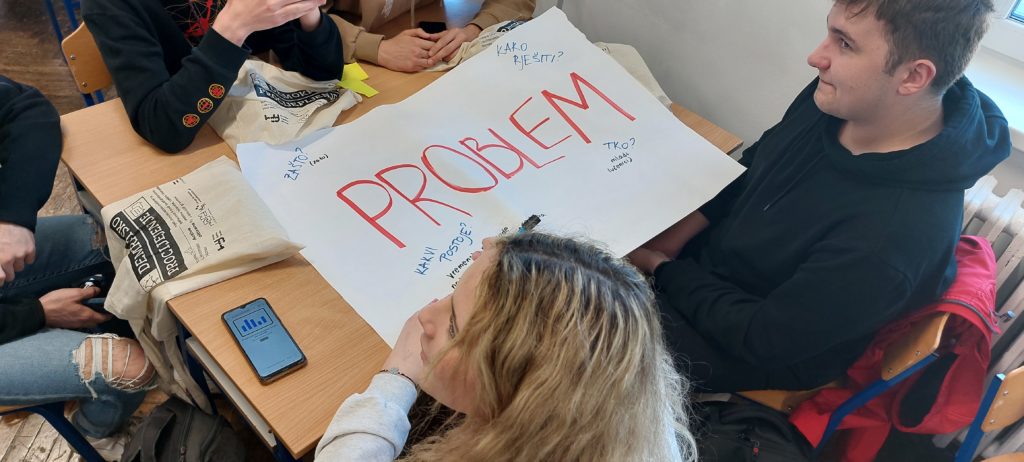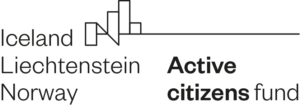Democratic Immunization – Debate Clubs and Deliberative Democracy as a Model for Developing Democratic Competencies and Participatory Decision-Making
Posted 27.03.2023.

Limited access to various activities that would equip citizens with the skills to proactively develop and advocate for their views is not only characteristic of young people in our society but also reflects a broader lack of awareness about the importance of active citizenship. However, this shortfall is most pronounced among young people who, due to external factors such as living in rural areas, have even fewer opportunities to engage in activities that develop democratic skills.
As part of the large project “Democratic Immunization – Debate Clubs and Deliberative Democracy as a Model for Developing Democratic Competencies and Participatory Decision-Making”, the Croatian Debate Society is expanding debate clubs as a successful model of civic education. These clubs help young people develop skills in argumentation, critical thinking, expression, teamwork, and sensitivity to diversity and human rights while also empowering them for informed action.
Branimira Penić, project activity coordinator, and Darija Jeger, trainer and mentor for youth involved in the project, shared insights on how young people and their teachers embark on the path of developing democratic competencies.
Knocking on the doors of counties and schools that are rarely visited
As part of the project, a training program was conducted for teachers on implementing the debate model within civic education, involving 40 high schools from various counties, including Vukovar-Srijem, Karlovac, Šibenik-Knin, Bjelovar-Bilogora, Sisak-Moslavina, and Brod-Posavina. The mentors working with teachers are volunteers who collectively logged an impressive 1,600 volunteer hours in 2022. So far, 900 people have participated in the project, including 658 young individuals. The numbers speak for themselves, but so do the results on the ground.
“Our team has held 25 meetings with teachers, training sessions for students on debate methodology, and eight deliberations, two of which have been accepted. In Knin, a space for youth gatherings will be established, while in Vukovar, the first-ever ‘Norijada’ celebration will be organized, which students previously had to celebrate in Vinkovci,” says Branimira. She emphasizes that the role of the Croatian Debate Society (HDD) as a community ally is simply to encourage decision-makers to participate in project activities, particularly in the deliberation processes.

“We carried out activities in smaller schools, mostly vocational schools, whose curriculum does not allow for these types of additional activities due to the structure of internships or practical training held within the school. Students and teachers usually meet after classes, often around 7 PM. Despite various challenges related to scheduling within schools, it has become evident that vocational schools have a strong interest in these types of student engagement programs.
Most of the counties where we worked face challenges with commuting students, as public transportation is poorly connected. As a result, students often have to arrive at school an hour earlier or return home several hours later. Coming from Zagreb, where public transport is much better connected, this experience made us more aware of the fact that students in rural areas do not have adequate access to public transportation,” says Branimira. She adds that, as part of the deliberative process in Vinkovci, new measures for youth were agreed upon, such as the City covering the cost of driving tests for graduating students.

What is deliberation?
In its broadest sense, deliberation provides a space where young people can present the challenges they face in their communities and be assured that decision-makers will be made aware of these issues. In this context, decision-makers primarily include the principals of the schools involved in the project, as well as the mayors and municipal leaders of the towns and municipalities where project activities were conducted. Deliberation is an open process in which problems are identified, but also potential solutions discussed.
“Through this project, we worked on empowering teachers who work with young people to implement informal teaching methods within the formal education system. We recognize that teachers need to be more approachable than the traditional education system often allows, and our role was to provide mentoring support to teachers in implementing the deliberation model through debate clubs. We were pleasantly surprised by the number of teachers from vocational schools, such as medical and economic schools, who showed great interest and a strong need for innovative teaching methods that equip students for active citizenship,” says Darija, who served as a mentor to both teachers and students in the implementation of debate club activities in schools.
Models of cooperation with decision-makers
HDD has a well-established program for schools, but working in new communities always presents challenges. HDD’s role is to serve as an ally to local civil society organizations and other representatives of the local community who participated in deliberations, including a wider network of professionals from various sectors, such as librarians, youth organizations, and other local stakeholders.
“It was easier for us to organize these activities because we were external participants and not always familiar with the internal relationships within the community. This also meant we were not as burdened by them. Young people appreciated hearing direct feedback from decision-makers in their communities, and it also raised the question of how these officials communicate their decisions to young people.”
HDD recognizes that even with the best plans and solutions for certain issues, this does not necessarily mean that things will automatically improve. A key aspect of this process is making participants aware that active citizenship is about addressing challenges openly—because if information stays within limited social circles, such as a classroom, school, or student council, change is unlikely to happen.
“We know this is not a perfect formula, but some deliberations do yield tangible results. Even those that don’t lead to immediate change serve as a form of education and empowerment. Some shift has occurred—a conversation has started, a space for discussion has been opened. For example, in a school in Kutina, a student pointed out that a faucet in the girls’ restroom was broken, and soon after, it was successfully repaired. We are aware that these are small changes, but they are happening nonetheless,” concludes Darija.

What bothers young people the most?
Some of the key challenges young people face include inadequate public transportation, schools designed exclusively for learning without social spaces (such as common rooms or lounges), lack of information about decisions that affect them, menstrual poverty, youth mental health, environmental protection, and opportunities for youth participation.
“Regardless of the fact that we worked with different counties and schools, the problems young people face tend to repeat or remain the same. What we can observe is that the issues bothering young people are the same ones discussed at the European level through various strategies and documents. However, the fight for the future is happening on a level far beyond us,” adds Darija, emphasizing that the problem is not that young people are uninterested but rather that the way they are included in decision-making processes is flawed.

How is it done in Iceland?
HDD’s project partner, alongside the Association of Cities and the Association of Croatian Secondary School Principals, is the Icelandic organization Citizens Foundation. As part of the project, they conducted training for teachers on using online tools for deliberation. By utilizing online platforms such as Citizens Foundation and Your Priorities, the deliberation process is made easier, particularly when engaging large groups of people or in situations where the participation of some individuals is not possible.
Why is this project important to HDD?
“Through this project, we recognized the need to expand the debate model to other stakeholders in the local community, with a particular focus on the education system. At the same time, we gained strong momentum to develop new projects based on what we experienced in the field. We want to create more opportunities for young people to be heard through debate, a model we know best, by those who, through collaboration, can achieve meaningful results,” concludes Branimira. She also adds that HDD has submitted two additional projects aimed at supporting vocational schools in expanding and implementing debate models to democratize school environments.
